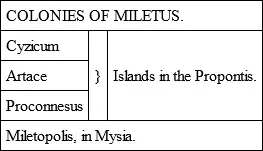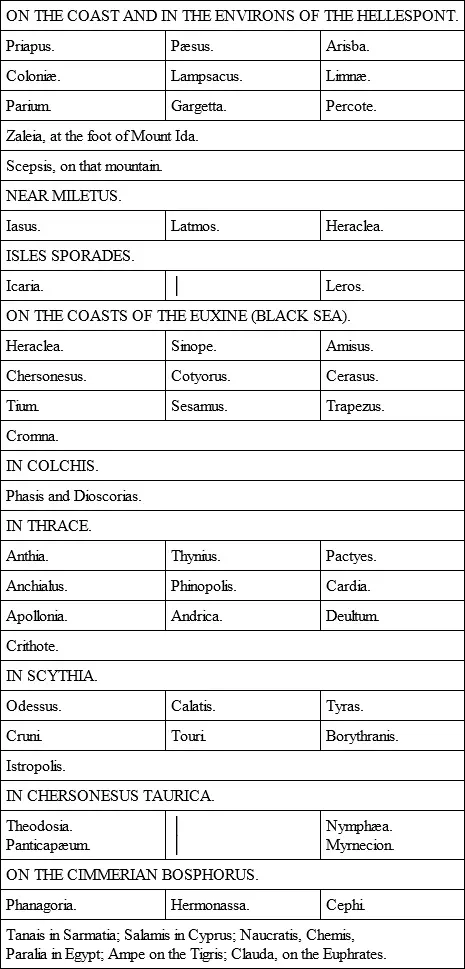Charles Bucke - Ruins of Ancient Cities (Vol. 2 of 2)
Здесь есть возможность читать онлайн «Charles Bucke - Ruins of Ancient Cities (Vol. 2 of 2)» — ознакомительный отрывок электронной книги совершенно бесплатно, а после прочтения отрывка купить полную версию. В некоторых случаях можно слушать аудио, скачать через торрент в формате fb2 и присутствует краткое содержание. Жанр: foreign_antique, foreign_prose, на английском языке. Описание произведения, (предисловие) а так же отзывы посетителей доступны на портале библиотеки ЛибКат.
- Название:Ruins of Ancient Cities (Vol. 2 of 2)
- Автор:
- Жанр:
- Год:неизвестен
- ISBN:нет данных
- Рейтинг книги:4 / 5. Голосов: 1
-
Избранное:Добавить в избранное
- Отзывы:
-
Ваша оценка:
- 80
- 1
- 2
- 3
- 4
- 5
Ruins of Ancient Cities (Vol. 2 of 2): краткое содержание, описание и аннотация
Предлагаем к чтению аннотацию, описание, краткое содержание или предисловие (зависит от того, что написал сам автор книги «Ruins of Ancient Cities (Vol. 2 of 2)»). Если вы не нашли необходимую информацию о книге — напишите в комментариях, мы постараемся отыскать её.
Ruins of Ancient Cities (Vol. 2 of 2) — читать онлайн ознакомительный отрывок
Ниже представлен текст книги, разбитый по страницам. Система сохранения места последней прочитанной страницы, позволяет с удобством читать онлайн бесплатно книгу «Ruins of Ancient Cities (Vol. 2 of 2)», без необходимости каждый раз заново искать на чём Вы остановились. Поставьте закладку, и сможете в любой момент перейти на страницу, на которой закончили чтение.
Интервал:
Закладка:
St. Paul, in his way from Corinth to Jerusalem, passed through Miletus; and as he went by sea, and would not take Ephesus in his way, he caused the priests and bishops of the church of Ephesus to come to Miletus 11 11 Acts xx. ver. 13. And we went before to ship, and sailed unto Assos, there intending to take in Paul: for so had he appointed, minding himself to go afoot. 14. And when he met with us at Assos, we took him in, and came to Mitylene. 15. And we sailed thence, and came the next day over against Chios; and the next day we arrived at Samos, and tarried at Trogyllium; and the next day we came to Miletus. 16. For Paul had determined to sail by Ephesus, because he would not spend the time in Asia: for he hasted, if it were possible for him, to be at Jerusalem the day of Pentecost. 17. And from Miletus he sent to Ephesus, and called the elders of the church. 18. And when they were come to him, he said unto them, Ye know, from the first day that I came into Asia, after what manner I have been with you at all seasons.
.
Miletus fell under subjection to the Romans, and became a considerable place under the Greek emperors. Then it fell under the scourge of the Turks; one of the sultans of which (A. D. 1175) sent twenty thousand men, with orders to lay waste the Roman imperial provinces, and bring him sand, water, and an oar. All the cities on the Mæander were then ruined: since which, little of the history of Miletus has been known.
The Milesians early applied themselves to navigation; in the spirit of which they, in the process of time, planted not less than eighty colonies, in different parts of the world; and as we are ourselves so largely engaged in colonisation, perhaps an account of the colonies, sent out by the Milesians, may not be deemed uninteresting.


From this list we may imagine to what a height of power and civilisation this city must have once attained. Babylon stands in a wilderness and a desert by its side.
Miletus was adorned with superb edifices; and was greatly celebrated for its trade, sciences, and arts. It gave birth also to many eminent persons; amongst whom may be particularly mentioned, Thales 12 12 He was the first that accurately calculated eclipses of the sun; he discovered the solstices; he divided the heavens into five zones, and recommended the division of the year into three hundred and sixty-five days.
, Anaximenes 13 13 The inventor of sun-dials and the gnomon. This philosopher had nevertheless many curious opinions; amongst which may be mentioned, that air was the parent of every created being; and that the sun, moon, and stars, had been made from the earth.
, Anaximander 14 14 He taught that men were born of earth and water, mixed together by the heat of the sun.
, Hecatæus 15 15 An historian.
, Timotheus 16 16 A musician.
, also the celebrated Aspasia, the wife of Pericles. It was also famous for its excellent wool, with which were made stuffs and garments, held in the highest reputation both for softness, elegance, and beauty.
It had a temple dedicated to Apollo Didymæus, which was burnt by Xerxes. The Milesians, however, soon after rebuilt it, and upon so large a scale, that Strabo describes it as having been equal in extent to a village; so large indeed was it, that it could never be covered. It stood in a thick grove. With what magnificence and prodigious spirit this edifice was designed, may in some measure be collected from the present remains. Strabo called it the “greatest of all temples;” adding that it continued without a roof on account of its bigness; Pausanias mentions it as unfinished, but as one of the wonders peculiar to Ionia; and Vitruvius mentions this among the four temples, which have raised their architects to the summit of renown 17 17 Ionian Antiquities.
.
There was a magnificent theatre also built of stone, but cased with marble, and greatly enriched with sculptures. There was also one temple of Venus in this town, and another in the neighbourhood.
Miletus is now called Palatskia (the palaces). Notwithstanding its title, and the splendour of its ancient condition, it is but a mean place now. The principal relic of its former magnificence is a ruined theatre, measuring in length four hundred and fifty-seven feet. The external face of this vast fabric is marble. The front has been removed. A few seats only remain, and those, as usual, ranged on the slope of a hill. The vaults which supported the extremities, with the arches or avenues of the two wings, are constructed with such solidity, that they will not easily be demolished. The entrance of the vault is nearly filled up with rubbish; but when Dr. Chandler crept into it, led by an Armenian, with a candle in a long paper lantern, innumerable bats began flitting about them; and the stench was intolerable.
The town was spread with rubbish and overgrown with thickets. The vestiges of “the heathen city,” are pieces of wall, broken arches, and a few scattered pedestals and inscriptions, a square marble urn, and many wells. One of the pedestals has belonged to a statue of the Emperor Hadrian, who was a friend to the Milesians, as appears from the titles of Saviour and Benefactor, bestowed upon him. Another has supported the Emperor Severus, and has a long inscription, with this preamble: “ The senate and people of the city of the Milesians, the first settled in Ionia, and the mother of many and great cities both in Pontus and Egypt, and in various other parts of the world. ” This lies among the bushes behind the theatre.
Several piers of an aqueduct are standing. Near the ferry is a large couchant lion, of white marble; and in a Turkish burying-ground another; and traces remain of an old fortress. Besides these, there are a considerable number of forsaken mosques; and among the ruins are several fragments of ancient churches.
Wheler says, that in his time, there were many inscriptions, most of them defaced by time and weather; some upon single stones, others upon very large tombs. On one of them were carved two women hunting, with three dogs; the foremost holding a hare in its mouth.
“Miletus,” says Dr. Chandler, from whom we have borrowed several passages in this article, “was once powerful and illustrious. The early navigators extended its commerce to remote regions; the whole Euxine Sea, the Propontis, Egypt, and other countries, were frequented by its ships, and settled by its colonies. It withstood Darius, and refused to admit Alexander. It has been styled the metropolis and head of Ionia; the bulwark of Asia; chief in war and peace; mighty by sea; the fertile mother, which had poured forth her sons to every quarter. It afterwards fell so low as to furnish a proverbial saying, ‘The Milesians were once great;’ but if we compare its ancient glory, and its subsequent humiliation, with its present state, we may justly exclaim, ‘Miletus, how much lower art thou now fallen 18 18 Herodotus; Strabo; Pausanias; Quintus Curtius; Prideaux; Chandler; Stuart; Barthelemy; Gillies.
!’”
NO. IV. – NAUPLIA
This town, now called Napoli di Romania, is situated along the foot of the rocky promontory, which projects into the sea, at the head of the gulf of Napoli. Its walls were built by the Venetians.
Ancient Nauplia, which is said to have been built by Nauplius, absurdly called the son of Neptune, became the chief naval arsenal of the Argives. Even so early as the time of Pausanias, however, it had become desolate; only a few remains of a temple, and of the walls, then existing. Its modern history is rather interesting.
Читать дальшеИнтервал:
Закладка:
Похожие книги на «Ruins of Ancient Cities (Vol. 2 of 2)»
Представляем Вашему вниманию похожие книги на «Ruins of Ancient Cities (Vol. 2 of 2)» списком для выбора. Мы отобрали схожую по названию и смыслу литературу в надежде предоставить читателям больше вариантов отыскать новые, интересные, ещё непрочитанные произведения.
Обсуждение, отзывы о книге «Ruins of Ancient Cities (Vol. 2 of 2)» и просто собственные мнения читателей. Оставьте ваши комментарии, напишите, что Вы думаете о произведении, его смысле или главных героях. Укажите что конкретно понравилось, а что нет, и почему Вы так считаете.












